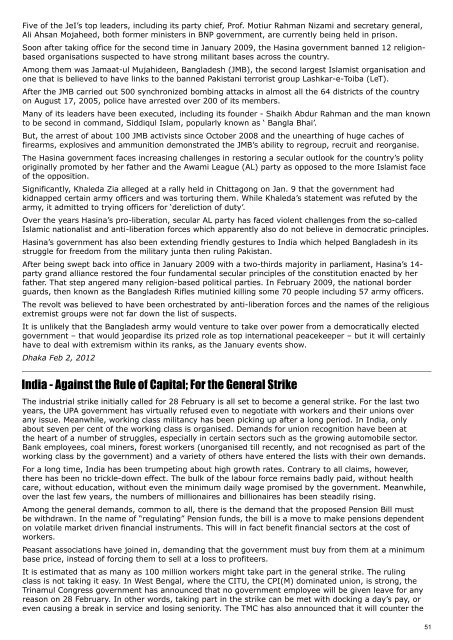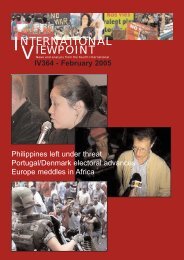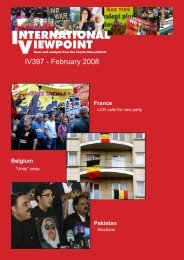download - International Viewpoint
download - International Viewpoint
download - International Viewpoint
You also want an ePaper? Increase the reach of your titles
YUMPU automatically turns print PDFs into web optimized ePapers that Google loves.
Five of the JeI’s top leaders, including its party chief, Prof. Motiur Rahman Nizami and secretary general,<br />
Ali Ahsan Mojaheed, both former ministers in BNP government, are currently being held in prison.<br />
Soon after taking office for the second time in January 2009, the Hasina government banned 12 religionbased<br />
organisations suspected to have strong militant bases across the country.<br />
Among them was Jamaat-ul Mujahideen, Bangladesh (JMB), the second largest Islamist organisation and<br />
one that is believed to have links to the banned Pakistani terrorist group Lashkar-e-Toiba (LeT).<br />
After the JMB carried out 500 synchronized bombing attacks in almost all the 64 districts of the country<br />
on August 17, 2005, police have arrested over 200 of its members.<br />
Many of its leaders have been executed, including its founder - Shaikh Abdur Rahman and the man known<br />
to be second in command, Siddiqul Islam, popularly known as ‘ Bangla Bhai’.<br />
But, the arrest of about 100 JMB activists since October 2008 and the unearthing of huge caches of<br />
firearms, explosives and ammunition demonstrated the JMB’s ability to regroup, recruit and reorganise.<br />
The Hasina government faces increasing challenges in restoring a secular outlook for the country’s polity<br />
originally promoted by her father and the Awami League (AL) party as opposed to the more Islamist face<br />
of the opposition.<br />
Significantly, Khaleda Zia alleged at a rally held in Chittagong on Jan. 9 that the government had<br />
kidnapped certain army officers and was torturing them. While Khaleda’s statement was refuted by the<br />
army, it admitted to trying officers for ‘dereliction of duty’.<br />
Over the years Hasina’s pro-liberation, secular AL party has faced violent challenges from the so-called<br />
Islamic nationalist and anti-liberation forces which apparently also do not believe in democratic principles.<br />
Hasina’s government has also been extending friendly gestures to India which helped Bangladesh in its<br />
struggle for freedom from the military junta then ruling Pakistan.<br />
After being swept back into office in January 2009 with a two-thirds majority in parliament, Hasina’s 14party<br />
grand alliance restored the four fundamental secular principles of the constitution enacted by her<br />
father. That step angered many religion-based political parties. In February 2009, the national border<br />
guards, then known as the Bangladesh Rifles mutinied killing some 70 people including 57 army officers.<br />
The revolt was believed to have been orchestrated by anti-liberation forces and the names of the religious<br />
extremist groups were not far down the list of suspects.<br />
It is unlikely that the Bangladesh army would venture to take over power from a democratically elected<br />
government – that would jeopardise its prized role as top international peacekeeper – but it will certainly<br />
have to deal with extremism within its ranks, as the January events show.<br />
Dhaka Feb 2, 2012<br />
India - Against the Rule of Capital; For the General Strike<br />
The industrial strike initially called for 28 February is all set to become a general strike. For the last two<br />
years, the UPA government has virtually refused even to negotiate with workers and their unions over<br />
any issue. Meanwhile, working class militancy has been picking up after a long period. In India, only<br />
about seven per cent of the working class is organised. Demands for union recognition have been at<br />
the heart of a number of struggles, especially in certain sectors such as the growing automobile sector.<br />
Bank employees, coal miners, forest workers (unorganised till recently, and not recognised as part of the<br />
working class by the government) and a variety of others have entered the lists with their own demands.<br />
For a long time, India has been trumpeting about high growth rates. Contrary to all claims, however,<br />
there has been no trickle-down effect. The bulk of the labour force remains badly paid, without health<br />
care, without education, without even the minimum daily wage promised by the government. Meanwhile,<br />
over the last few years, the numbers of millionaires and billionaires has been steadily rising.<br />
Among the general demands, common to all, there is the demand that the proposed Pension Bill must<br />
be withdrawn. In the name of “regulating” Pension funds, the bill is a move to make pensions dependent<br />
on volatile market driven financial instruments. This will in fact benefit financial sectors at the cost of<br />
workers.<br />
Peasant associations have joined in, demanding that the government must buy from them at a minimum<br />
base price, instead of forcing them to sell at a loss to profiteers.<br />
It is estimated that as many as 100 million workers might take part in the general strike. The ruling<br />
class is not taking it easy. In West Bengal, where the CITU, the CPI(M) dominated union, is strong, the<br />
Trinamul Congress government has announced that no government employee will be given leave for any<br />
reason on 28 February. In other words, taking part in the strike can be met with docking a day’s pay, or<br />
even causing a break in service and losing seniority. The TMC has also announced that it will counter the<br />
51









